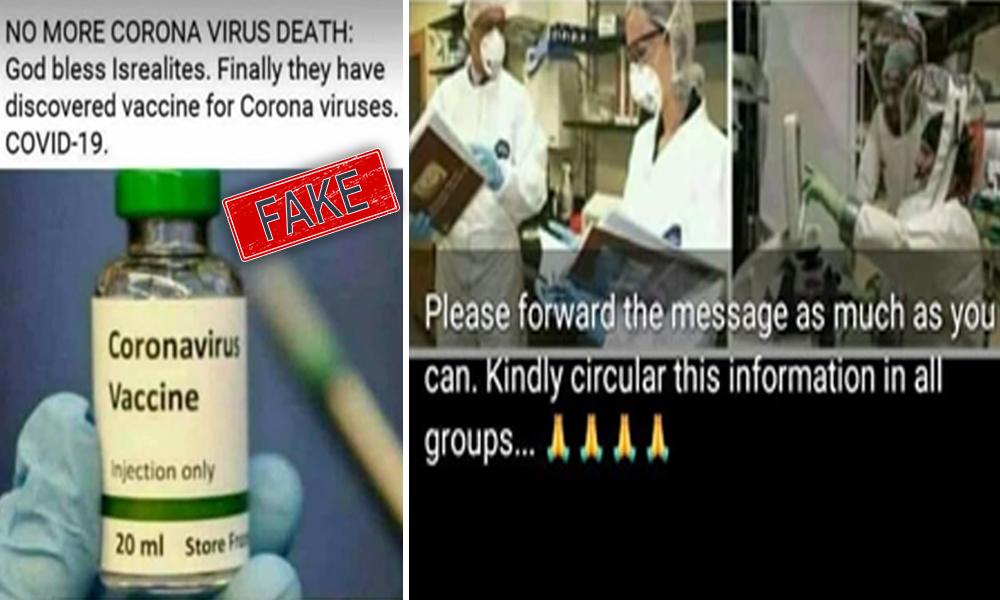 The anti-vaccine movement has gained prominence on online platforms in recent years, and anti-vaccination campaigners are now devoting all their attention to spreading misleading claims about the corona virus. First of all, a video based on false claims about osteopath Carrie Madig's corona virus vaccine trials has become popular on social media. is video falsely claims that it will alter the vaccine recipient's DNA (which contains genetic information).
The anti-vaccine movement has gained prominence on online platforms in recent years, and anti-vaccination campaigners are now devoting all their attention to spreading misleading claims about the corona virus. First of all, a video based on false claims about osteopath Carrie Madig's corona virus vaccine trials has become popular on social media. is video falsely claims that it will alter the vaccine recipient's DNA (which contains genetic information).
"The Code 19 vaccine is designed to incorporate us into genetically modified organisms."
She also claims, without any evidence, that vaccines will "make us all accustomed to an artificial intelligence interface."
According to the World Health Organization (WHO), 25 vaccines are currently in clinical trials around the world, but none of them will alter human DNA, nor will it allow people to use artificial intelligence interfaces. The technology to connect to does not exist at all. These vaccines are designed to train our bodies to recognize and fight viruses and to develop an immune response. Carrie Maddge also makes a number of other false claims, including that vaccine trials "do not follow a safe scientific protocol to ensure that the vaccine is safe." The BBC's online health editor, Michelle Roberts, says "before vaccines are widely recommended to be used, they have to go through strict safety checks."
We tried to get Kerry Madig's position on these claims, but we received no response.
The video was first uploaded to YouTube in June, where it was viewed by more than 300,000 users, but it is also popular on Facebook and Instagram. It is still spreading in many countries besides the United States and the United Kingdom. Sarah Downs, a South African scientist known as the "Mistress of Science", was introduced to the video by her mother. Sarah said her mother's prayer group had shared the video with her. Sarah sent the truth of the misinformation shared in this video to her mother's prayer party. "Now they know better, which I am very happy about because they believed what was said in the video," she said. When the preliminary results of the Oxford Corona Vaccine were published on Monday, there was a lot of discussion on Facebook groups about the corona virus. Some Facebook users posted comments saying they did not want the vaccine because they thought it would be used as "laboratory test mice" and that they would "deliberately" use the vaccine. The production capacity has been increased rapidly. Although there may be safety concerns given the rapid pace of vaccine development, Professor Andrew Pollard, head of the Oxford Vaccine Group, told the BBC that clinical trials involved very strict safety measures. It also includes security reports sent to regulators in participating countries. Trials in Oxford ended quickly during the first two phases because the university was already working on a corona virus vaccine. In addition, the speed of administrative and financial support and the overwhelming interest in the vaccine trial meant that no moment was wasted in finding volunteers for the vaccine trials. Now that the trials are entering their third phase and thousands more volunteers will be taking part, all participants will be monitored for the side effects of the vaccine. Vaccine participants in the first two phases had no side effects, although 16-18% of the test participants reported fever. Researchers say that paracetamol can be used for side effects. When the first Oxford vaccine trial began, a claim was made that the first volunteer had died. The BBC's medical correspondent Fergus Walsh and Fact Checkers soon uncovered the rumors. Fergus Walsh also did an interview with the volunteer. A meme circulating on social media claims that vaccines were responsible for 50 million deaths during the Spanish flu pandemic in 1918. But this is completely wrong. First of all, as the Centers for Disease Control in the United States reported, there was no vaccine available at the time. Historian and author Mark Hennings Boom says that scientists in Britain and the United States have experimented with basic bacterial vaccines, but these were vaccines that we will not recognize as vaccines today. "It simply came to our notice then that no one knew that influenza was a virus."
There were two main causes of death. A strong immune response that fills the lungs with fluid as a result of an early flu infection or virus.















0 Comments